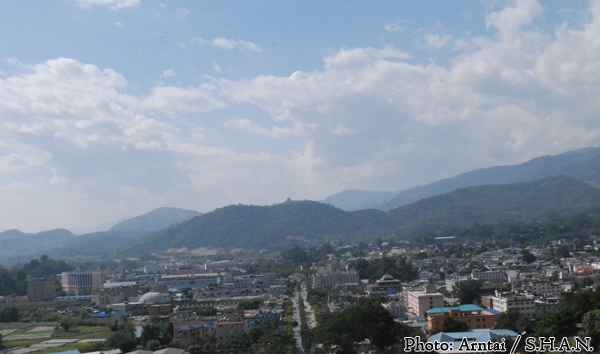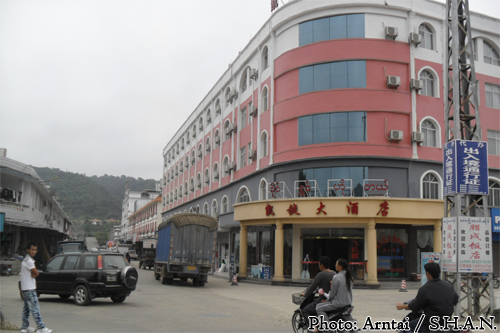Almost 3 months after Wa and Mongla signed new ceasefire agreements with Naypyitaw, on 6 and 7 September respectively, SHAN reporter investors have returned to change the slump that had taken place during the last two years, according to Arn Tai who returned recently from Mongla.

The following is his report: When we were there last year during the Shan New Year, Mongla was almost a ghost town. Most of the shops were closed after their Chinese owners left. There was nothing to see in the evening, everything dark, except at the festival ground.
But now all the shops are opened and the lights are on late into the night. There are lots of cars and lots of people, especially those coming from across the border.
We also saw 4-5 new buildings under construction. When I asked the authorities, I was told they were hotels.
The former Lan Dong hotel complex of Zhao Wei, the owner of the Kings Romans Casino in Ton Pheung, Laos, however, now looked deserted. “Only a few Kokangs are staying there,” said my guide, a permanent resident there.
Roads are being enlarged too: from Hsop Lwe to Mongla and from Mongla to Hsaleu further west near the border with Wa. People in Hsaleu told me the road going from Mongphen, inside the Wa territory to Panghsang, the Wa capital, also under construction, is even a bigger affair. “It is a 4 lane one, built by Thai engineers,” said a Shan administrative official.
Moreover, Mongla is embarking on building a new town at Hsop Lwe, where the Lwe meets the Lam. (The Hsop Lwe we know is called Hsop Khong, the mouth of the Khong River)
 As a result, the Shan New Year this year in Mongla is swarming with cars and people from all directions. It took us 1 hour to get from our hotel to the festival ground, although it was only 1 km away. “Reminds me of Bangkok during the rush hour,” one of the Shans from the Thai capital said.
As a result, the Shan New Year this year in Mongla is swarming with cars and people from all directions. It took us 1 hour to get from our hotel to the festival ground, although it was only 1 km away. “Reminds me of Bangkok during the rush hour,” one of the Shans from the Thai capital said.
With more people in Mongla, more problems have followed, especially drugs. I remember there were only 4 checkpoints last year from Mongla to Hsop Lwe (or Hsop Khong to the local people): Hsop Khong, Kiang Khang, Nampan and Hsop Lwe. But now we were counting 5 more ones.
At every checkpoint, we had to climb down our trucks which were searched by the soldiers (in green uniforms) and by the narcotics officials (in camouflage). “They have been really tough on the travelers especially after the killings at the Golden Triangle,” said a local.
On 7 October, 12 Chinese crewmen, including 2 women, were found floating near Chiang Saen. It was two days after Thai authorities seized two Chinese ships where 1 dead gunman and 920,000 meth pills were found. The drugs were believed to have originated from the Wa-Mongla areas.
Meanwhile, the United Wa State Army (UWSA) and the National Democratic Alliance Army (NDAA), the latter popularly known as Mongla, despite ceasefire agreements with Naypyitaw, are still on high alert. “We never stop training,” one officer told SHAN.
Moreover, Mongla is embarking on building a new town at Hsop Lwe, where the Lwe meets the Lam. (The Hsop Lwe we know is called Hsop Khong, the mouth of the Khong River)


